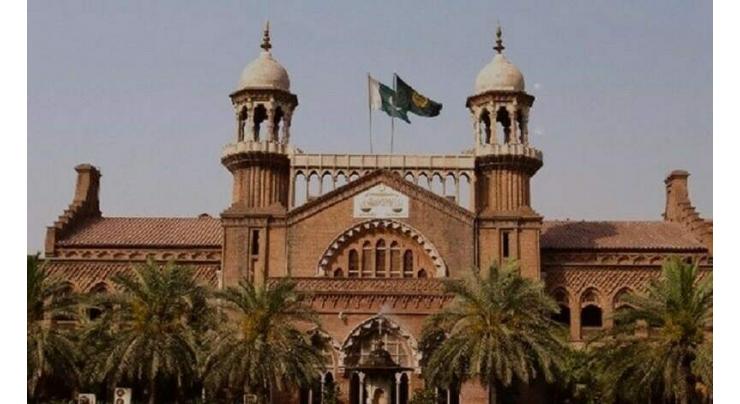
Lahore High Court (LHC) Declares FPA, Other Tariff In Electricity Bills Illegal
Fahad Shabbir (@FahadShabbir) Published February 06, 2023 | 11:52 PM

The Lahore High Court (LHC) on Monday declared fuel price adjustment (FPA), quarter tariff adjustment, change of status of tariff from industrial to commercial by the National Electric Power Regulatory Authority (NEPRA), for the period it was not fully constituted under Section 3 of the NEPRA Act, 1997, as illegal
LAHORE, (UrduPoint / Pakistan Point News - 6th Feb, 2023 ) :The Lahore High Court (LHC) on Monday declared fuel price adjustment (FPA), quarter tariff adjustment, change of status of tariff from industrial to commercial by the National Electric Power Regulatory Authority (NEPRA), for the period it was not fully constituted under Section 3 of the NEPRA Act, 1997, as illegal.
Justice Ali Baqar Najafi issued the 81-page verdict reserved a few months ago after hearing detailed arguments of the parties. More than 3600 domestic and industrial electricity consumers, including Muhammad Azhar Siddique, had filed petitions against imposition of FPA and other tariffs in the bills.
In its judgment, the court, disposing of the petitions, directed NEPRA and other respondents to inform the consumers about the charges on a monthly basis, adding that the fuel price adjustment should not go beyond 7 days and the quarter tariff adjustment should not go beyond the statutory period.
The court also directed respondents not to charge any exorbitant tariff beyond the paying capacity of the domestic consumers. "Fix the responsibility of over-charging on the basis of line losses and the less efficient power plants and the financial burden will also be shared by the companies under a rational proportion", it added.
The court further directed to explore the cheap modes of producing electricity and evolving mechanisms for its quick availability, besides directing to ensure the smooth supply of electricity based on demand. "Not to unilaterally change the type of tariff from Industrial to Commercial without hearing such consumers", the judgement added.
Moreover, the court directed the Federal government to provide a maximum subsidy to the domestic consumers using 500 units per month, besides stopping from demanding extraordinary taxes having no nexus with the consumption of energy.
The court further directed the government to explore the Solar, Hydel, Nuclear and Wind sources of producing electricity and arrange for cheap purchase of sources of electricity from other countries.
In their final arguments, the petitioners' counsel had pleaded with the court to declare the FPA for the month of July 2022, and other relevant tariffs as illegal, saying that the NEPRA made the decisions in violation of the requirements under Section 3 of the NEPRA Act 2017. They submitted that the decisions taken by the NEPRA for tariff determination were without the full strength, adding that out of 4, only 2 members were functional along with the Chairman. They further submitted that the authority was not legally constituted, therefore, it did not have the full power to decide.
They further submitted that the appeal before the appellate tribunal under Section 12-G would not be an adequate and efficacious remedy as the appellate tribunal had the power to decide an appeal only if the order was passed by the Authority constituted under Section 3.
They submitted that the decision made by the authority was oblivious to certain facts and as such it did not protect the interest of consumers, therefore, obviously, the petitioners have the legitimate expectation not to pay the additional surcharges etc. which were not previously demanded from them at such a high rate.
However, the NEPRA and other respondents' counsel argued that the authority was functioning properly and the decisions were made after due process under the law.
They submitted that the petitions were not maintainable as there was adequate and efficacious remedy available to the petitioners. The petitioners could approach the appellate tribunal under Section 12-G, they added. They submitted that the fuel price adjustment variation was not a new phenomenon.
Related Topics
Recent Stories

3 Gawadar attack victims funeral offered

Mbappe says he will leave PSG at end of season

Usmani felicitates Sardar Saleem on taking oath as Punjab Governor

DC for provision of facilities to people in Lasbela

Solar storm could bring auroras, power and telecoms disruptions

Court grants interim bail to PTI leaders

Ulema, Mashaykh call for political accountability, collaboration for Pakistan's ..

SHRC asks NADRA to issue CNICs to transgender as per law

Flash floods kill 50 in one day in north Afghanistan

CDA chief expresses commitment to promoting modern-day technologies

By wide margin, UN General Assembly votes to back Palestinian bid for membership ..

Musadik slams PTI's political approach as provocative
More Stories From Pakistan
-
LHC stops govt from distributing bikes among students till May 13
4 hours ago -
ECP refutes false reports on reserve seats reaction
4 hours ago -

3 Gawadar attack victims funeral offered
4 hours ago -

Usmani felicitates Sardar Saleem on taking oath as Punjab Governor
4 hours ago -

DC for provision of facilities to people in Lasbela
5 hours ago -

Court grants interim bail to PTI leaders
5 hours ago
-

Ulema, Mashaykh call for political accountability, collaboration for Pakistan's stability
5 hours ago -

SHRC asks NADRA to issue CNICs to transgender as per law
5 hours ago -

CDA chief expresses commitment to promoting modern-day technologies
4 hours ago -

Musadik slams PTI's political approach as provocative
4 hours ago -

Saudi Arabia to test flying taxis, drones this Hajj season: Minister
4 hours ago -

Governor for making comprehensive policy to protect universities from financial crisis
4 hours ago









